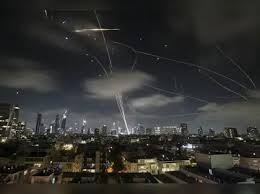World on edge as US launches strikes on Iran.
The US direct involvement in West Asia could disrupt the fragile world order.
The Israel–Iran conflict has taken a grim turn as the US has directly involved itself in the fray by breaching Iranian airspace and hitting its three nuclear sites. The United States’ unprecedented strikes on three Iranian nuclear facilities — Natanz, Fordo, and Isfahan — have raised the chances of other powers like Russia and China joining it covertly. What began as a shadow conflict between Israel and Iran has now erupted into a wider confrontation with global stakes, as Washington’s intervention risks igniting a regional conflagration with cascading consequences for energy security, international diplomacy, and global peace. In a moment of grave international concern, Indian Prime Minister Narendra Modi emerged as a voice of restraint and reason. He spoke directly with Iran’s newly elected President, Masoud Pezeshkian, and urged immediate de-escalation, emphasising dialogue and diplomacy as the only viable path forward. The entry of the US into the fray dramatically raises the stakes. With multiple US military bases spread across the Gulf and Iran’s bid to block the Strait of Hormuz — a vital chokepoint through which over 20 per cent of the world’s oil passes — the risk of a broader regional war is real and immediate, resulting in hardships for many nations dependent upon Gulf oil, including India. India, with its deep energy dependence on Gulf states and close ties to both Iran and the US, is vulnerable to the ripple effects of the conflict. A disrupted oil supply could cause domestic inflation to spike, derail economic forecasts, and strain foreign exchange reserves. Moreover, India’s strategic investment in Iran’s Chabahar Port — a crucial component of its connectivity to Afghanistan and Central Asia — could be imperilled by continued instability. India’s diplomatic tightrope walk is therefore not just about foreign policy symbolism; it is about national interest and regional stability. PM Modi’s appeal reflects not only India’s strategic calculus but also its potential to play the role of a mediator in a time of intensifying hostilities.
Beyond regional tensions, the current escalation has shaken global oil markets. Prices have surged amidst fears of supply disruption. This is not merely an Israel–Iran war anymore. It has the contours of a conflict that could draw in global powers, unsettle economies, and rupture the fragile world order. With tensions at an all-time high, the window for diplomacy is narrowing. Yet, it is precisely at this point that the world needs more statesmanship and less brinkmanship. Iran must be given diplomatic avenues to avoid escalation without losing face.
The US must show strategic restraint and allow space for mediation. Israel must realise that regional peace cannot be achieved through unilateral military campaigns. In this fragile moment, countries like India can serve as credible voices for peace. By engaging all sides through backchannels and multilateral forums like the UN, BRICS, and the Non-Aligned Movement, India could help forge a ceasefire framework — or at least open lines of dialogue. In this fraught hour, the world must heed calls like that of Prime Minister Modi — calls for de-escalation, dialogue, and a return to diplomacy.
